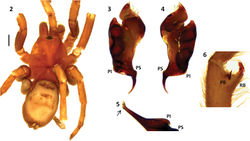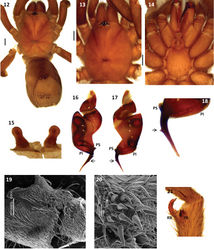Melloleitaoina crassifemur
| Notice: | This page is derived from the original publication listed below, whose author(s) should always be credited. Further contributors may edit and improve the content of this page and, consequently, need to be credited as well (see page history). Any assessment of factual correctness requires a careful review of the original article as well as of subsequent contributions.
If you are uncertain whether your planned contribution is correct or not, we suggest that you use the associated discussion page instead of editing the page directly. This page should be cited as follows (rationale):
Citation formats to copy and paste
BibTeX: @article{Perafán2014ZooKeys404, RIS/ Endnote: TY - JOUR Wikipedia/ Citizendium: <ref name="Perafán2014ZooKeys404">{{Citation See also the citation download page at the journal. |
Ordo: Araneae
Familia: Theraphosidae
Genus: Melloleitaoina
Name
Melloleitaoina crassifemur Gerschman & Schiapelli, 1960 – Wikispecies link – Pensoft Profile
Material examined
Only type material.
Type material
Holotype male from Argentina, Salta, Orán, Urundel, 335m above sea level, 23°33'0"S, 64°25'0"W, viii-1947, Misión Ricardo N. Orfila leg. (MACN-Ar 2285).
Diagnosis
Male differs from other Melloleitaoina species by the palpal bulb morphology with very curved embolus without triangular tooth, well-developed and subequal PI and PS (Figs 3 and 4), and apex widened (Fig. 5). Females unknown.
Re-description
Holotype male (MACN-Ar 2285): total length, not including chelicerae or spinnerets, 14.1, carapace length 5.9, width 5.3. Color (in alcohol): cephalotorax, legs light brown, abdomen grayish brown. Anterior eye row slightly procurved, posterior recurved. Eyes and interdistances: AME 0.18, ALE 0.30, PME 0.14, AME-ALE 0.06, PME-PME 0.38, PME-PLE 0.04, ALE-PLE 0.08, AME-PME 0.04, ALE-ALE 0.40. OQ length 0.50, width 0.96, clypeus 0.14. Fovea transverse, procurved, width 0.70. Chelicerae with 10/12 well-developed teeth on furrow promargin, few small teeth on the proximal area of furrow. Labium length 0.68, width 1.07 with 7 cuspules. Maxillae with 74 cuspules. Sternum length 2.70, width 2.70. Tarsi I-IV scopula widely divided, by conical setae thicker and longer. Tarsal claws with 2-3 small teeth on proximal half, near the inner edge. Sparse scopulae on metatarsi; metatarsi I-III apically scopulate, IV without scopula. Tibia I with prolatero-ventral distal apophysis with two very unequal branches (Fig. 6); PB subtriangular, small, with basal curved spine, much longer than branch, RB curved, much larger than PB with internal medial spine that exceeds length of branch. Metatarsus I slightly curved, flexion on RB. Femur III very thickened. Type III-IV intermediate urticating setae present. PMS well-developed, PLS normal, apical segment digitiform. Palpal organ piriform with the embolus very curved, two prolateral keels (PI and PS) present, subequal, apex widened (Figs 3–5).
Spination. Femora: palp, I-IV 0. Patellae: palp, I-IV 0. Tibiae: palp 0, I 0, II 1P, III 2V, 1P, 2R, IV 1R. Metatarsi: I 1V, II 1V, III 3V, 2P, IV 4V, 2P, 1R. Tarsi: palp, I-IV 0.
Legs and palpal segments lengths (femur/patella/tibia/metatarsus/tarsus). Palp: 3.1/2.0/2.5/1.2 total 8.8; I: 5.5/3.5/4.4/3.8/2.4 total 19.6; II: 4.9/1.9/3.6/4.4/2.3 total 17.1; III: 3.5/2.0/2.8/3.7/2.2 total 14.2; IV: 6.0/2.2/5.0/6.3/2.5 total 22.
Remarks
The female Melloleitaoina crassifemur was described thirteen years after the original description of the male holotype of the species. This female specimen was assigned as Melloleitaoina crassifemur because it was collected near the male type locality. We examined male specimens from the same locality of this female and found important morphological differences between these males and the holotype Melloleitaoina crassifemur, as the palpal bulb shape, the presence of a conspicuous triangular tooth on the embolus (Figs 16 and 17) and the spiniform setae on coxae III and IV (Figs 19–21), also it present on the female. Taking into account that these new males are sympatric with the female attributed to Melloleitaoina crassifemur we considered them as conspecific, and are here described as a new species.
Taxon Treatment
- Perafán, C; Pérez-Miles, F; 2014: Three new species of Melloleitaoina Gerschman and Schiapelli, 1960 (Araneae, Mygalomorphae, Theraphosidae) from northern Argentina ZooKeys, 404: 117-129. doi
Images
|

